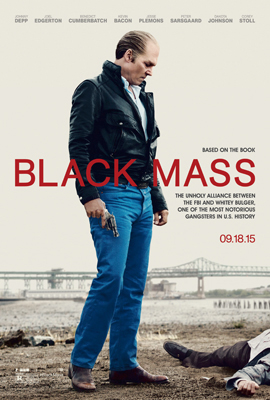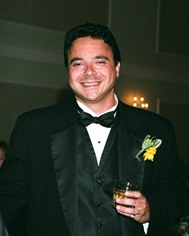 With “Black Mass,” Warner Bros. continues its tradition of their classic gangster movies from the ‘30s and ‘40s by depicting the rise and fall of real-life South Boston crime lord James ‘Whitey’ Bulger and gives Johnny Depp one of his best performances.
With “Black Mass,” Warner Bros. continues its tradition of their classic gangster movies from the ‘30s and ‘40s by depicting the rise and fall of real-life South Boston crime lord James ‘Whitey’ Bulger and gives Johnny Depp one of his best performances.
Beginning in 1975, “Black Mass” traces the events of Whitey’s rise to power and eventual fall through the 20-year alliance with childhood friend and fellow ‘Southie,’ FBI agent John Connelly (Joel Edgerton). Returning to Boston, Connelly wants to make a name for himself and rise through the ranks of the FBI by stamping out the Italian mafia influence of the Angiulo family in the North End. He reaches out to Whitey’s brother, Billy (Benedict Cumberbatch) to meet with Whitey and get the secret street information that will bring down the Angiulo family. Billy, now a Senator, can’t be involved with his criminal brother but cryptically says if Connelly’s looking for Whitey, Whitey will find him.
Whitey does indeed find Connelly and the two embark on what’s essentially a devil’s bargain: Whitey feeds information concerning the Angiulos to Connelly; Connelly lets Whitey slip into the shadows to conduct his nefarious extortion and racketeering undertakings untouched (providing Whitey never murders anyone). It’s a brilliant self-serving move on Whitey’s part- notoriously intolerant of informants, his crew would never suspect that Whitey himself could be a rat. Although calculating, Whitey is sickeningly self-aware enough to know that he is a rat (insisting Connelly call their deal an ‘alliance’) but agrees to the deal to have the FBI fight his battle for him- with the Angiulos out of the way, Whitey can control crime in Boston. The cards play out just as Whitey imagines: using Whitey’s information, the FBI clamps down on the Angiulos to secure and expand Whitey’s criminal empire and Connelly benefits by rising through the ranks of the FBI. Unfortunately for Whitey, he’s not the only rat in town and tattling is not an exclusive enterprise.
When the rats emerge, “Black Mass” treats its audience to some great work by supporting actors: Peter Sarsgaard as Brian Halloran who, after his business partner is killed by Whitey after a deal gone bad, runs to the FBI to snitch to save his own life and Juno Temple as Deborah, the stepdaughter of one of Whitey’s crew who, after getting pinched on a prostitution rap, is taken to task by Whitey to tell him what she told the police. Whatever words Brian or Deborah have spoken, they’re still rats to Whitey and, where rats are concerned; Whitey’s actions speak louder.
In addition to Sarsgaard and Temple’s supporting work, the acting in “Black Mass” is uniformly impressive. While Depp is certainly the focal point, Edgerton as Connelly deserves equal recognition. As a parallel to Whitey’s own rise to power, Edgerton transforms Connelly into a man equally jaded by his own career ascension and association with Whitey. Most notably, Edgerton shines in a scene in which Connelly adopts the oily charm of Whitey in confronting an FBI superior who questions why the FBI has never arrested Whitey themselves. Edgerton’s schmoozy, blasé attitude in Connelly’s dodging of this pointed question shows just how far Connelly’s morals have fallen and just how much Whitey has influenced him.
But it’s Depp’s performance as Whitey that’s the anchor to “Black Mass.” Depp infuses Whitey’s character with all of the cruel, calculating coldness of a man who needs those exact qualities to be in control of the criminal activity around him. Made-up to look like the real ‘Whitey’ Bulger, Depp uses this jarring appearance to his advantage: with slicked-back, balding hair and a smile that reveals a browning, crooked front tooth, Depp looks every bit the sleek rat he’s portraying. And with contact lenses to give Depp piercing blue eyes, Depp’s gaze takes on a demonic quality: we can see just how a devil’s bargain was struck between himself and Connelly as if Whitey had been the devil himself.
Particularly of note in Depp’s performance is a scene where Whitey confronts Connelly’s FBI partner during dinner at Connelly’s home. Asking Connelly’s partner how he prepared the delicious steaks they’re eating, the partner remarks the marinade is a ‘family secret’ but proceeds to tell Whitey anyway. When Whitey menacingly takes the partner to task on divulging a ‘secret’, Depp allows us to see Whitey’s true dangerous nature.
I guess the biggest question surrounding “Black Mass” is whether or not director Scott Cooper can give Johnny Depp the long-awaited Best Actor Oscar he managed to secure for Jeff Bridges by directing Bridges to an Oscar win for “Crazy Heart.” As “Mass” illustrates, the devil works in mysterious ways so it’s not out of the question- Depp definitely delivers. Do I think Depp can win? I’d tell you, but I’m not a rat. Besides, for fans of those old Warner Bros. gangster movies, I’d want you to see “Black Mass” for yourself.
